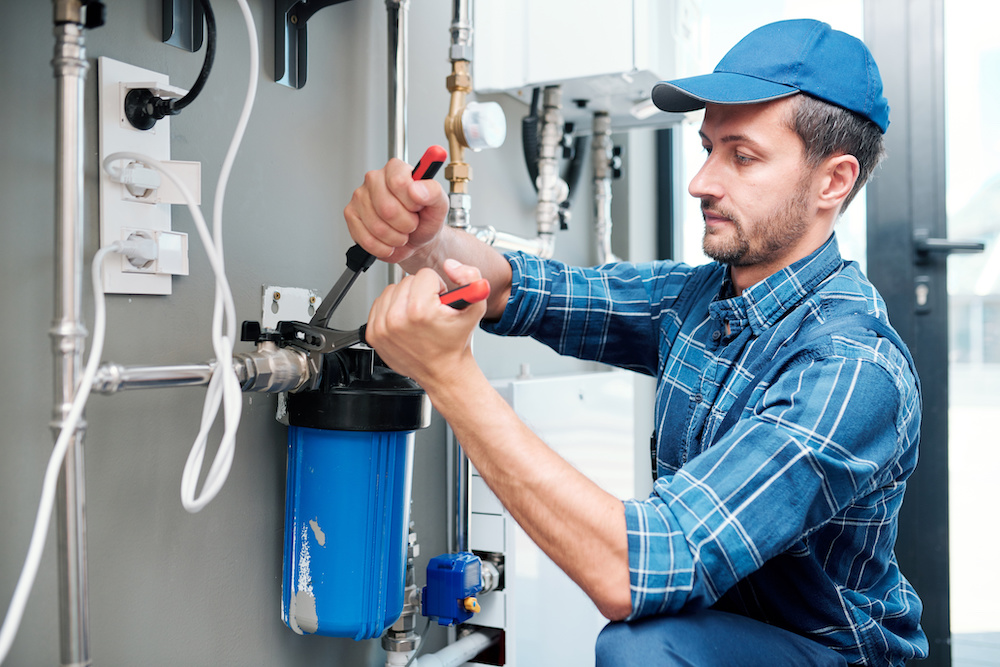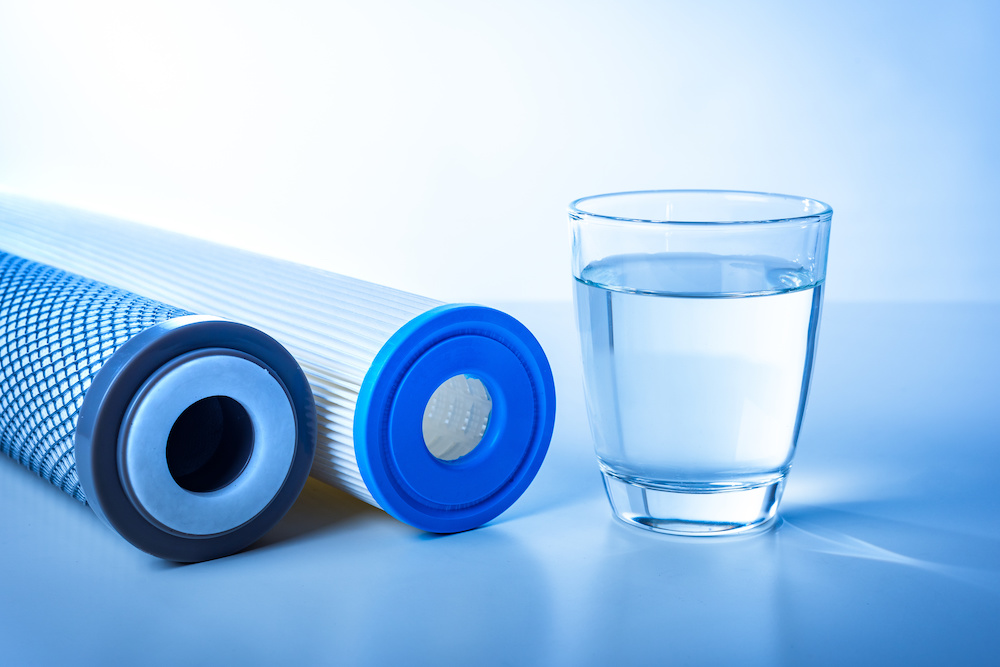According to the Centers for Disease Control and Prevention, about 7.2 million Americans get sick from waterborne diseases annually.
Even with modern water purification methods, an additional line of defense might be necessary.
With this in mind, you might be having a water distiller vs water filter dilemma.
Worry no more because we’ll examine which of the two is better for home use and consumption.
Water Distillers Explained
Water distillers are machines or systems that bring water to its boiling point, turn it into vapor, condense it, and restore it to its liquid condition.
However, this time, it’s almost entirely free from contaminants.
Since distilling involves evaporation, it removes heavy metals, germs, sediments, and other contaminants because they cannot transform into steam.
These impurities remain in the boiling chamber when the water changes from a liquid to a gaseous state.
The distiller subsequently cools the evaporated water, transforming it into pure and safe drinking water, free of all the contaminants it once had.
To know if a water distiller is the right water purification method for you, let’s look at its pros and cons.
Pros
Here are some of the benefits you’ll enjoy from using water distillers:
- Distilled Water Is the Purest Form of Water
If you’re looking for the purest water, then water distillers may be for you.
According to a study from the University of Georgia, distilling water removes up to 99.9% of contaminants.
They include harmful pathogens, biological contaminants, volatile chemicals, and other impurities in your water supply.
Using distilled water also lessens your chances of contracting waterborne diseases significantly.
Most of the impurities found in unfiltered tap water are generally harmful at specific amounts or high concentrations when consumed or comes into contact with your skin.
Thus, removing them from your water supply becomes crucial.
Moreover, since distilled water essentially becomes soft water, it contains no minerals such as calcium and magnesium that can clog pipes or tubing.
This makes it the best type of water for sensitive machines such as electrical appliances and medical apparatus.
- Distilled Water Is Easily Absorbed by the Body
Distilled water is beneficial for athletic consumption, especially after strenuous activities, since it’s been scientifically proven to be more rapidly absorbed by the body.
It’s speculated to be the result of the lack of minerals and other contaminants that impedes the body’s internal water absorption abilities.
However, note that solely drinking distilled water during high-strain activities can be harmful due to its lack of electrolytes in the form of minerals.
- Drinking Distilled Water Can Prevent Diseases
Doctors typically recommend distilled water for people suffering or at high risk from certain diseases or who have compromised immune systems.
That is because specific minerals and trace contaminants found in non-distilled water can worsen the patient’s condition.
For example, some sources believe drinking distilled water can wash away calcium deposits in joints, thus curing arthritis.
Also, since the distillation process removes all the minerals, it’s assumed that drinking distilled water lessens your risk for kidney stones caused by mineral deposits in the kidneys.
Cons
The drawbacks of using distillers that you need to make a note of are as follows:
- Removes Beneficial Minerals
Distilled water is so pure that it doesn’t contain even the essential minerals your body needs, such as potassium, zinc, sodium, phosphorus, calcium and magnesium.
Although distilled water is safe for human consumption, it’s not ideal for long-term use since it can cause electrolyte imbalance which can be dangerous if not addressed immediately during highly straining activities.
The symptoms of electrolyte imbalance are diarrhea, irritability, cramps, and nausea.
Although you can supplement these minerals with food or supplements, it might be beneficial for people with specific dietary needs to stick to filtered mineral water.
- Distilled Water May Taste Weird
People who drink distilled water for the first time often complain about its weird or flat taste, leading them to drink it less.
This may be because they’re used to mineral or tap water with a distinct, familiar flavor.
However, food manufacturers typically use distilled water specifically for its lack of familiar taste.
Bread baked with distilled water may also be smoother since the flour absorbs distilled water better.
- Distillation Process Takes a While
Distilled water may not be for you if you want to use it instantly. Although there are water distillers that automatically fill themselves after use, they only distill around 12 gallons per day and cost more than $1000.
Since they use heat to evaporate the water, there is a large use of energy as well.
On the other hand, cheaper options, which cost around $100, usually distill only 1/3 of a gallon every hour. You’ll also have to fill these out after every use manually.
Although this could suffice for one person’s drinking requirement, you can’t use this practically for your typical household consumption, such as bathing and washing dishes or clothes.

Water Filters Explained
Water filters are refining systems that remove impurities using chemical treatments, biological processes, or physical filters.
They come in different forms, but the most commonly used formats for domestic purposes are whole-house water filtration systems and point-of-use water filters.
A whole-house water filtration system generally employs pipes, filters, tanks, and cartridges for filtering.
They clean all water sources in your house and prevent hard water scale build-up that can clog your pipes or stain your kitchenware.
On the other hand, point-of-use filtering systems only filter water from a specific faucet or water source.
An example is countertop filters that you can put near your kitchen sink to filter your cooking or drinking water.
While point-of-use filters are less expensive than whole-house filtering systems, they only supply one source of filtered water for your home and do not safeguard your pipes or appliances.
The two major home filtering systems also typically use different methods, such as mechanical, reverse osmosis, and carbon adsorption filters.
Mechanical filtering is one of the most popular filtration methods. Using physical filters called cartridges, they trap contaminants such as free-floating sediments, harmful microorganisms, or other particles from the water within their micron rating range.
For example, cartridges rated one micrometer can filter most bacteria, such as E. coli, while those rated 100 micrometers can filter protozoa, such as Cryptosporidium and Giardia.
Another popular method for drinking water filtration is the reverse osmosis system. Reverse osmosis filters use a semi-permeable membrane to hold contaminants, such as sediments and bacteria.
However, this method can also remove chemicals and heavy metals, leaving you with a filtration efficiency of up to 99%.
Finally, adsorption filtration devices use activated carbon to draw and hold pollutants and dissolved solids.
Since it employs cartridges that need regular changing, these are typically better suited at point-of-use systems like faucets, counters, and under sinks.
Let’s look at the water filter’s pros and cons to determine if it is a suitable water purification method for you.
Pros
What you’ll love most about a water filtering system are the following:
- Many Available Options
With many filtration systems and methods, you’re likely to find one that fits your budget, needs, and preferences.
You can find affordable point-of-use water filters that typically cost around $50, while a whole-house water filtration system will cost more depending on its functions and your household size.
- Removes Most Harmful Contaminants
Some water filter systems, such as reverse osmosis, can give you 99.9% contaminant filtration, while more affordable options can significantly lessen hard minerals and other contaminants.
For example, sediment filters with a five-micron NSF rating can give you up to 95% filtration of anything of similar size.
Additionally, the Environmental Protection Agency noted that adsorption filters using granulated activated carbon could effectively filter between 60 to 80 chemicals, reduce another 30 chemicals, and moderately reduce 22 other chemicals.
Whichever your choice may be, these systems add a line of defense between you and waterborne diseases.
- Easily Maintained
Most point-of-use water filters are easily maintained. Generally, they come with replaceable cartridges and filters that you have to change depending on how much you use them or the system you use.
- Filtered Water Retains Healthy Minerals
Unlike distilled water, filtered water retains non-harmful minerals for drinking. This is helpful if you’re conscious of your overall mineral intake.
Cons
Before you buy a water filter, make sure you consider the following drawbacks:
- Some Options Need Professional Installation
Whole-house water filtering systems may need professional installation, depending on your DIY skill level, adding initial costs to sometimes already costly systems.
That is because complex filtration systems may need specific skill sets and tools to be correctly installed.
Some installations, such as water softeners, may also need government permits, depending on your location.
That is because the government placed specific regulations regarding their use due to potential environmental damage due to salt output.
- Needs Regular Maintenance
Despite being relatively simple to maintain, water filters still need routine cleaning and maintenance to work properly.
Both point-of-use filters and reverse osmosis systems also need new filters every six to twelve months, which is a long time if you consider how much water you use with them.
However, note that you should immediately inspect and change your filters when you taste or smell something different.
Water Distiller vs Water Filter: The Verdict
Choosing between a water distiller vs water filter won’t be as difficult once you know what you need and how much your budget is.
Water distillers can be costlier than water filters but will give you higher purification ratings. However, note that distilled water also removes vital minerals.
On the other hand, water filters are more versatile since they have more choices for different budget ranges and necessities. They’re also typically more cost-effective.
Ultimately, these water purification methods allow you to save money, especially when you consider how much medical bills cost should you contract waterborne diseases.

